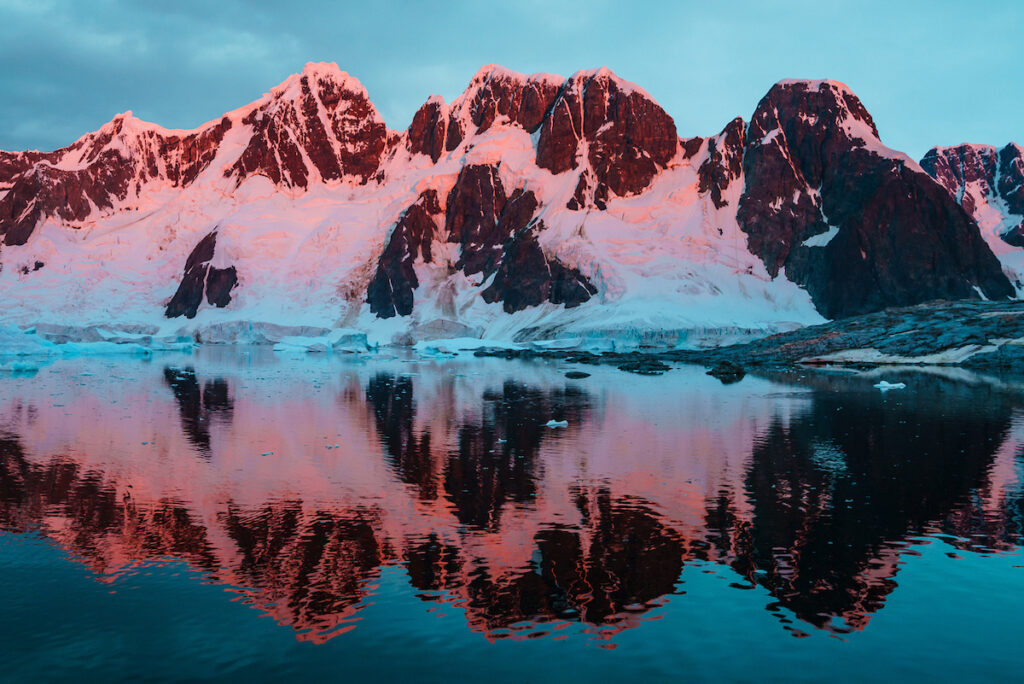
We Cannot Make Money on a Dead Planet
By Cristina Mittermeier
May 2024
Antarctica is the coldest, most remote and driest (yes, driest) continent on Earth. It’s also a harbinger of the profound impact that climate change will have on our planet’s systems. There, climate change is not just about rising temperatures and melting ice, but also about the intersection of scientific discoveries, environmental concerns and geopolitical dynamics. As someone who has participated in more than 10 expeditions there with National Geographic and SeaLegacy, I have seen firsthand the impacts of a warming planet on Antarctica.
Since the dawn of the industrial revolution, the average global temperature has risen by approximately 1.15 degrees Celsius (2.07 degrees Fahrenheit). The World Meteorological Organization anticipates that the world will exceed the 1.5 degrees Celsius (2.7 F) threshold by 2028, driven by human-induced climate change and a warming El Niño — the cyclical weather phenomenon that temporarily heats ocean regions and increases global temperatures. The increase will have a significant impact on ecosystems such as the polar regions and the coral reefs, which will experience the largest bleaching event in history in the coming months. The consequences will touch every aspect of life on Earth.
In June 2023, just months after the conclusion of a cooling three-year La Niña weather cycle, uncontrollable wildfires spread through large areas of Canada, releasing smoke into the U.S. and triggering air quality alerts in dozens of downwind states. In July, the world set a new global temperature record for three consecutive days, and many parts of Europe, Asia and the U.S. experienced intense and continuous heat in July and August. At the same time, India faced a heavy monsoon season that flooded several regions of the country. More recently, a historic wildfire caused significant damage to an entire town in Maui due to high winds and dry vegetation. El Niño might be an even angrier sequel.
"As someone who has participated in more than 10 expeditions to Antarctica, I have seen firsthand the impacts of a warming planet."
In Antarctica, the warming trend endangers the stability of ice shelves and the integrity of the continent’s vast ice sheets, and exacerbates ice melt, leading to accelerated sea-level rise and global ecosystem disruptions. Concerted global action is urgently needed to mitigate further warming and protect the delicate balance in the polar regions, upon which the planet’s stability depends.
The melting of ice in Antarctica could lead to terrifying changes in the distribution and intensity of ocean currents. Even small disruptions in the circulation patterns of the Southern Ocean could affect fish stocks and alter weather patterns worldwide. The weakening or cessation of major currents, such as the Atlantic Meridional Overturning Circulation, could alter weather patterns, increase sea-level rise, and cause shifts in marine habitats. These changes pose risks to coastal communities and biodiversity, and have far-reaching implications for global food security and the functioning of Earth’s interconnected climate system. To prevent the collapse of crucial global currents, we must take immediate action to reduce carbon emissions and curb the devastating effects of climate change.
We cannot make money on a dead planet. As investors, we must take into account the planetary effects — good and bad — of all our financial decisions. I am confident that the knowledge, passion and expertise of the team at Endurance28 will help guide us through these discussions.
Cristina Mittermeier is a member of Endurance28’s advisory board, and an influential conservation photographer, biologist, author, and President of SeaLegacy, a nonprofit environmental protection organization.
